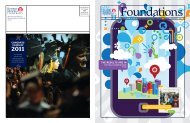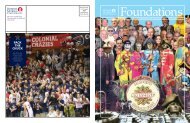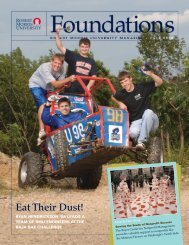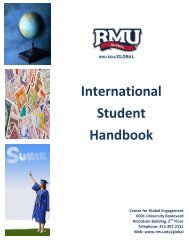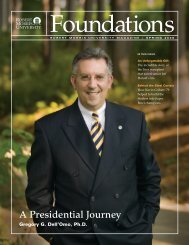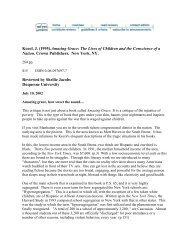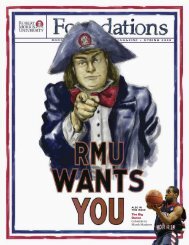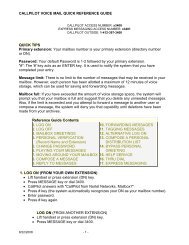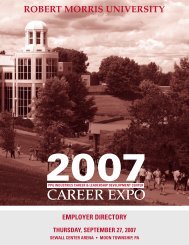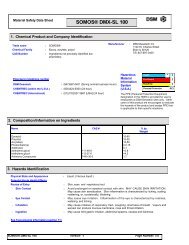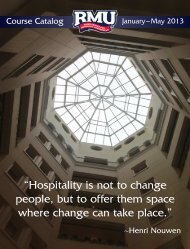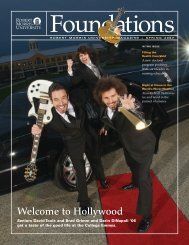HOMECOMING - Robert Morris University
HOMECOMING - Robert Morris University
HOMECOMING - Robert Morris University
Create successful ePaper yourself
Turn your PDF publications into a flip-book with our unique Google optimized e-Paper software.
The last time Larry O'Learywalked into a classroomwas 1983. Today, he's backat school via the virtualclassroom, earning his M.S.degree in organizationalleadership in RMU's fullyonline graduate program.O'Leary says it's too early for him toassess how e-learning stacks up to atraditional education, but he hasnoticed that class participation anddiscussions are much more extensivethan they were in his brick and mortar days. Whilestudents in a classroom typically have three hours aweek to talk about issues, he notes that those onlineare reading, writing, and posting comments five toseven days a week, 24 hours a day. And while he mightnot know what his classmates look like, "you can get afeel for how people think and the type of personality theyhave by reading their introductory bios, posts andresponses," he says.Whatever opinion one may have of distance learning, onething is sure: It is not going away. From 2002 to 2010, whilethe overall student body in higher education increased by twopercent annually, the number of students taking at least oneonline class a semester grew by 20 percent, according to arecent report in The Chronicle of Higher Education. Today,nearly one out of every three college students takes at leastone course online.The growth spurt is apparent at RMU. Two years ago, theuniversity offered four graduate online degrees. Last year thenumber jumped to nine, including instructional leadership,HR management, competitive intelligence systems, and theuniversity’s flagship M.B.A.Undergraduates can choose among seven online degrees,from business and nursing to English and psychology."Students expect it, the market demands it, and thetechnology makes it possible," says professor Lois Bryan,D.Sc., who teaches managerial accounting for RMU's onlineM.B.A. program.But the jury is still in session over how well virtual learningcompares to a traditional education. Tensions are apparent ina recent Pew Research Center survey of college presidents, inwhich nearly half said they believe an online course does notprovide an equal educational value compared to one taken inthe classroom. Bryan, who also teaches traditional businesscourses, agrees there are some drawbacks. "In the classroom,I get a lot of energy and cues from students as to where thediscussion should go. When students don't understandsomething, I get an immediate question. That's nothappening online yet."Some RMU faculty argue that an onlineeducation is better than a traditional one.Anthony Petroy, D.M., assistant vice president of theuniversity's online and off-campus programs andassistant professor of organizational leadership, saysa lot depends on the instructor. Online learning canbe much more successful than the traditionalclassroom, he says, provided the instructor has astrong presence and is active in discussionthreads and responds promptly to studentquestions. Even face-to-face interaction ispossible in the virtual classroom; Petroy usesSkype for real-time video chat with his students.The only difference in an online course is the delivery, saysDarcy Tannehill, Ed.D., vice president of online and offcampusprograms and associate professor of education. And,she adds, students cannot hide in an online class. "Manyprofessors can vouch that often in the classroom setting, twoor three students dominate the discussion, while the majoritycontribute little," says Tannehill. "But online, all students mustrespond to discussion posts from their professors and peers."While intimidation, uncertainty, or apathy may keep someclassroom students from participating, Tannehill says thosestudying online can take the time they need to read and thinkabout their responses, do some research and replyintelligently – when they are ready.The university's B.S. degree inhealth services administrationused to be a hybrid ofclassroom time and onlinework, but the major is nowentirely online. The program'snew director, JosephAngelelli, Ph.D., formerly ofBrown <strong>University</strong>, says thechange actually sets thebar higher."Students arenot limited bya weekly classtime, butare able tocommunicate allthe time," he says. "They can be more reflective, and facultyare able to be in constant contact with them." Many of thestudents are already working in health care fields, so theybring their everyday work experiences to the discussions,Angelelli says.That appeals to students like John Shingle, a sophomorein the program. "Classroom discussions tend to be moreteacher-driven, but online they are more student-driven,which has its benefits," he says. For example, one recentdiscussion about long waits in the emergency room garnered40 comments. "In the classroom, one or two students wouldhave said something, and that would have been the endof it," Shingle says.RMU's online health services administration degree programwas ranked #5 in The Best Colleges' Top 10 Bachelor of HealthManagement and Health Administration Degree Programs of2011-2012. Angelelli is grateful for the distinction, but adds,"I'd like us to be number one."Another sign of the health of the university's online programsis that the majority of students keep coming back. While mostonline courses have retention rates that average about 50percent, according to Tannehill, RMU had a 94 percentretention rate in graduate online courses and a 97 percent inundergraduate courses in fall 2011. "Once you're here,"Tannehill says, "we want to do everything we can to keepand engage you."WRITTEN BY JIM TALERICO >> TALERICO IS AN ADJUNCT PROFESSOR OFENGLISH AND COMMUNICATION SKILLS AT RMU



